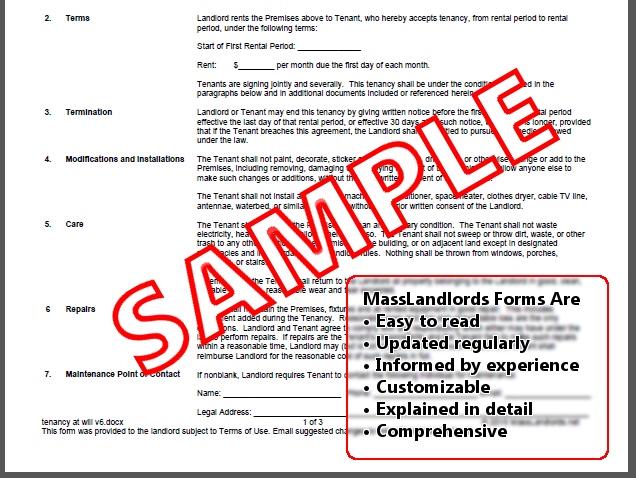How to Renew a Lease in Massachusetts
There are two options for how to renew a lease in Massachusetts. You can sign a completely new lease with the tenants, or you can agree in writing to modify or continue the existing lease.
Some Leases Automatically Renew
It's important to understand what kind of lease you have now. A "fixed term lease" has a definite end. A "self-renewing" or "self-extending" lease will renew according to what it says in the agreement. Some leases automatically repeat the original term. For instance, a one-year lease can repeat to another one-year lease. Other leases convert to tenancy-at-will, or month-to-month.
The title of the lease document is not enough to determine whether the lease is "fixed term" or "self extending". You need to read the portions of the lease that pertain to termination or renewal.
Mistakes to Avoid when Renewing a Rental Agreement
The one thing you should not do is ignore the expiration of a lease. If the agreement expires without either the landlord or the tenant taking some action, then both parties are left uncertain about the situation. Under the lease, the tenant was not allowed to have a pet. If the lease has expired, does that mean a pet is now allowed?
If the lease expires without action or renewal, the tenant does not become a squatter. Under Massachusetts law, they become either a "tenant at will" or a "tenant at sufferance" . The difference is whether they have the landlord's permission to remain. A "tenant at will" does have permission. A "tenant at sufferance" does not. The different types of tenancies have different rules.
The best thing to do is to agree in writing on how the tenant is going to stay.
Don't wait until the last minute, either. Start this process at least 30 or preferably 60 days before the expiration date. This gives the landlord and the tenant plenty of time to discuss required changes in a no-pressure environment. The surest way to make a tenant dislike you is to ignore the renewal and then create a lot of stress with rent raises or other contract changes at the last minute.
Signing a Whole New Lease
There are advantages and disadvantages to renewing a lease by signing an entirely new lease.
Advantages: Signing a whole new lease gives absolute clarity on the rules, the new term, and the new rent. Remember that you cannot one-sidedly raise the rent. You need to follow a rent raise process and use a rent raise form. If the tenant signs a new lease, then the new rent can be whatever you both agree to. The other advantage is that you get to use the latest lease available, with all the bells and whistles you've added since you first signed that tenant. If you end up in court, the court has zero work to do to determine which agreement applies. There is only one current agreement.
Disadvantages: When you renew a lease by signing a whole new one, you have a lot of paperwork. You also edge towards the territory of mistrust. Most tenants will sign without reading, but in the back of their minds they will be nervous about what they are doing. "Did the landlord change anything?" Others will be explicitly nervous about signing and will read the whole agreement again. "What is the landlord trying to pull?" Either way, this is an expensive process for both parties.
Signing a Written Modification or Extension
Instead of renewing a lease by signing a whole new lease, you and the tenant can agree to use the conditions and clauses of the existing lease for a new time period. You can also agree to modify certain clauses or conditions, like the rent.
Advantages: This approach is very fast. The tenant needs only to read the modification terms. It makes it clear how similar the new agreement will be to the old lease. It gets the tenants explicit approval for any changes, like rent increases.
Disadvantages: If your agreement ends up in court, this will create a slightly sloppier presentation of your paperwork. The judge will ask for your rental agreement. You will have to first present the signed modification or extension showing what document governs the current tenancy. You will then have to present the original signed agreement showing what clauses are in use. If you have repeated the modification or extension more than once, you may have to show all the signed modifications or extensions in order to arrive at the present day in one unbroken chain.
To view this form, you must be logged-in and a member in good standing

MassLandlords is a nonprofit dedicated to helping owners rent their property. We try our best, but we can't guarantee these forms will always work. We provide legal information but never advice particular to your situation. Nothing on this site is meant to create an attorney-client relationship. We advise you consult with an attorney.




